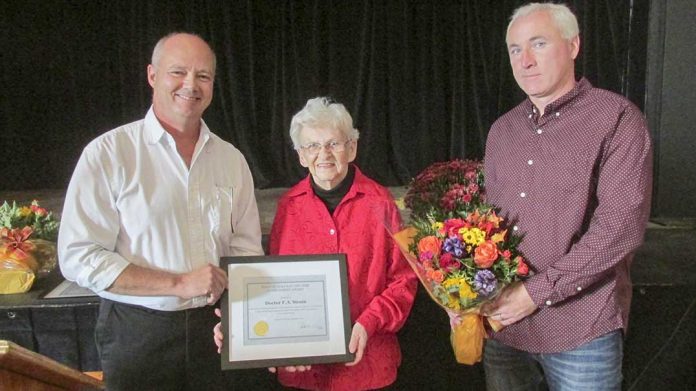MANITOULIN ISLAND – The Traditional Ecological Knowledge (TEK) Elders group, which is made up of representatives through the Robinson-Huron Treaty area, has given its unanimous support for court action to be taken in regards to the use of aerial spraying of herbicides by provincial and federal ministries within the Treaty areas. They say they will be going to court to force the government to live up to promises made and signed in the Robinson-Huron Treaty of 1850, which guaranteed First Nations the right to hunt, fish, gather berries and use plant medicines in traditional territories. The Constitution Act of 1982 reaffirms those rights, and the elders contend that these rights are being violated by aerial spraying being carried out on their lands without even any consultation or input from First Nations.
“Back when I was chief of Sheshegwaning First Nation there were all kinds of animals, fish and birds around, the vegetation was good, the water was healthy to drink and use. Today, everything is so polluted; the whole world has a big problem not just our area,” stated Bill Antoine, a member of the TEK Elders at a meeting last week on Manitoulin. “Now people are getting sick from drinking or using the water, and everything is dying off-flies, insects, birds, fish, and animals. We are all here for a reason; we don’t need aerial spraying, it is polluting our areas.”
“We have been working on a solution to all of this, and bringing our concerns forward to the government and these agencies that use these sprays and they aren’t listening. Enough is enough,” stated Ray Owl, chair of the TEK Elders.
Stephen O’Neill, an associate lawyer with Nahwegahbow Corbiere Genoodmagejig Barristers and Solicitors, told the gathering that under the Robinson-Huron Treaty and others, the Ministry of Natural Resources and Forestry and Ministry of Environment are supposed to provide for consultation and input on any work such as aerial spraying taking place in the First Nations treaty area.
The meeting was told that under changes in the Environmental Assessment in 1994, still no broad consultation with First Nations has taken place on aerial spraying.
“The TEK Elders mandate recently, led by Ray (Owl) and Willie (Pine) is that court action should be taken,” said Mr. O’Neill. He said with the proposed court action, one of the things that the TEK Elders would be hoping for is securing from the court an injuction-moratorium on aerial spraying in the First Nation treaty area. “The TEK Elders are sayin enough is enough and this needs to stop.” He said the court action would also try to secure both the provincial and federal governments accommodating the First Nations interests to allow for their input.
Mr. O’Neill said resolutions will now need to be provided by all 21 First Nation band councils within the Robinson-Huron Treaty area in support of the court action being taken.
“I think the package of materials we bring to court will be quite large,” said Mr. O’Neill. “They’ll finally listen to you, when this gets in court.”
“We need to take the government to court on this very serious matter,” said Mr. Owl. “Our concern is that those that should be looking after us are not doing so. We have to take the government to court. We as the owners of these treaty lands, have to have the laws abided by outside agencies.” He said the TEK Elders will also be forwarding their concerns to England, indicating what they have had to do to have mistakes rectified by governments.
The environment is being destroyed, he said, noting, “yesterday in a field near Espanola I saw a bear eating grass. They should be in the bush eating berries, but it is due to the environment being destroyed that we see this type of thing taking place.”
“I’ve been with this for five years,” said Mr. Owl. He said animals, insects, plants, fish, water, land and humans are being affected by the aerial spraying. He stated, “we’re not taking this action because we don’t like the MNRF and Hydro One. We don’t like what they are doing to our environment.”
Mr. Owl noted as well he had written his concerns to Health Canada but they had passed the authority over to the province and MNRF to approve chemical use on “our territory. They never informed us of this or asked for our input.”
Mr. Owl said it is the young generation and further generations that will be affected the most by the environment being damaged. “When you see all the dead trees on the side of the highway, something was done that is killing them.”
“As Ray said the spraying is killing the animals, vegetation, fish, animals, trees and the things we use for our traditional medicines,” said Mary McGregor. “They are spraying right over our water and swamps. We need to stand behind Ray and Willie on this, enough is enough.”
“We have to fight for our children, for our grandchildren, we have to do something,” said Ms. McGregor.
A request was made of a show of hands to all those in favour of the court action being taken, with the vote being a unanimous yes among the 32 representatives at the meeting.





